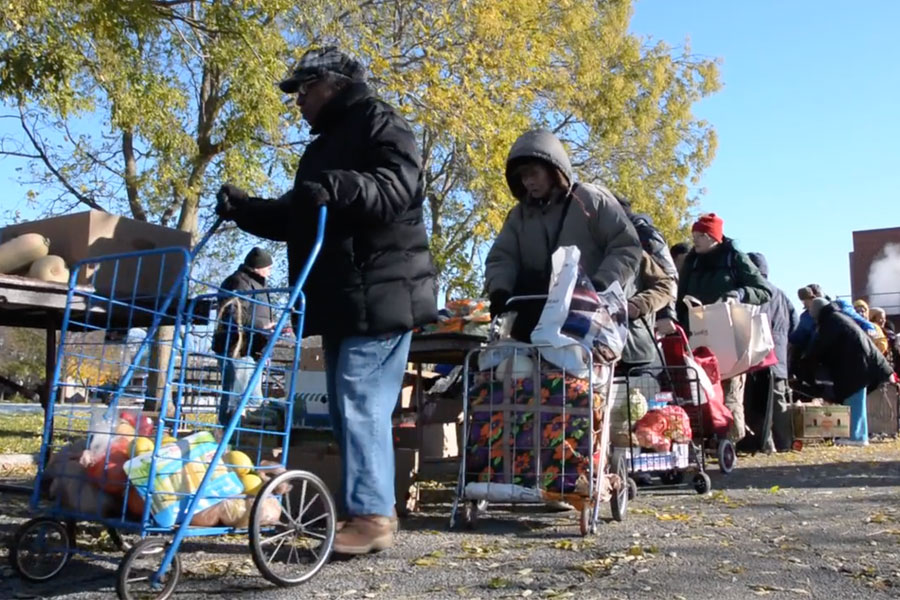Social service organizations stay consistent through budget cuts
Source: Interfaith Action Evanston
People line up for groceries in Evanston. The city has not changed its holiday services despite state-wide budget cuts.
December 3, 2019
For many families, the holiday season is a time of celebration and happiness. But for those who do not have a home to go to or are experiencing food insecurity, the months of November and December may not be as joyous.
In 2018, according to the United States Interagency Council on Homelessness, homelessness impacts 10,643 people in the state of Illinois. Organizations such as Connections for the Homeless and Interfaith Action of Evanston aim to help — especially during the winter months, when it may be difficult to see others celebrating the holidays.
Sue Murphy, the director of Interfaith Action of Evanston, said despite an influx of holiday volunteers and visitors, her organization strives to keep their soup kitchens running as normal during the winter months — and Interfaith Action of Evanston isn’t the only organization with that mentality.
Nia Tavoularis, the director of development for Connections for the Homeless, said that the group has kept its services consistent, even during state-wide budget cuts that affected social service programs.
“There were really significant budget cuts and budgeting issues in the state of Illinois that impacted a lot of social service agencies from 2012 to 2015,” Tavoularis said. “We have recovered from that, and the state is paying us on time, and they’re even modestly increasing support for our programs.”
Though organizations may often receive funding from the state government, local offices also play a role in supporting the function of social service groups.
Interim city manager Erika Storlie said that Evanston incorporates these organizations into the yearly budget in two places — groups can apply for funding through Community Development Block Grants and the city’s Mental Health Board, a group dedicated to the wellness of Evanston residents. During the budget crisis, Storlie said that the city’s funding became even more essential.
“The budget cuts exacerbated the need for us to continue to provide services,” Storlie said. “The city tried to step in and fill that gap a little bit, even though there wasn’t an increase in our funding.”
In 2018, Murphy said the group received approximately $20,000 from the Community Development Block Grant. However, she said that the organization isn’t funded at all by the state.
Conversely, Connections for the Homeless was given $718,000 from the state and $487,000 from the city during the fiscal year ending on June 30, 2018, according to their 2018 audit. Tavoularis said that the organization also continues to advocate for more homelessness prevention funding at the state level.
Storlie said that she hopes the city and the state will continue to fund these organizations because they are an essential part of the Evanston community.
“There is nothing more vital than taking care of our residents, and the work that these organizations do has a very big impact on the community,” Storlie said. “Without them providing services, we would not be the community that we are, so they definitely provide a great value and have an incredible impact.”
Email: [email protected]
Twitter: @jacobnfulton1


